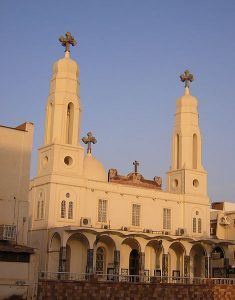By Morning Star News –

Coptic cathedral in Khartoum, Sudan. (Wikipedia)
The appointment of a Christian woman to the council overseeing transition to civilian rule in Sudan is a hopeful sign, but some persecution-weary Christians are less than optimistic about prospects for improved religious rights.
Raja Nicola Eissa Abdel-Masih, a Coptic Christian who long served as a judge in Sudan’s Ministry of Justice, was one of six civilians appointed to the 11-member Sovereignty Council on Aug. 21. But Christians who have seen increased persecution from former President Omar al-Bashir’s Islamist campaign of the last seven years question whether Abdel-Masih and the new government can counter an entrenched Islamist mindset.
The Rev. Yahia Nalu of the Sudan Presbyterian Evangelical Church (SPEC) said Abdel-Masih’s appointment is a positive symbol, but that it remains to be seen whether the council, with six civilian and five military members, can bring equality.
“Sudan’s case has to do with equality and the rule of law – rights have to be based on citizenship and nothing else,” Pastor Nalu told Morning Star News.
Abdel-Masih has said her appointment will enhance religious coexistence in Sudan. But the Rev. Kwa Shamaal (also transliterated Kuwa Shamaal) of the Sudanese Church of Christ, jailed for nearly two years between 2015 and 2017, is among those who believe her appointment does not necessarily mean discrimination, false charges and confiscation of church properties will end in Sudan.
“Although there is a new government formed, that does not mean Christians will be free from persecution in Sudan,” Pastor Kwa said.
Other church leaders feel that not much can be expected of the new government. The Rev. Sidik Anglo of the SPEC said the formation of a new government is good politically but may not translate into improved conditions for churches.
“Up to this moment, there is nothing clear in the political arena,” Pastor Anglo said.
The new administration has indicated it seeks to make Sudan a country inclusive of all faiths, and Abdel-Masih has shown support for Christian rights. She advocated for religious rights of Christians in September 2012, when she objected to the closing in 2011 of the Special Commission for the Protection of the Rights of Non-Muslims in Khartoum.
The commission had represented non-Muslims arrested for alleged violations of sharia (Islamic law) to law enforcement agencies and published reports and recommendations to the government about non-Muslims’ rights. The Bashir administration closed it after the secession of South Sudan in 2011.
Abdel-Masih has also criticized employers for failing to grant Christians their legal right to two hours of prayer and has objected to the government compelling children to go to school on Sundays, depriving them of their right to worship.
Christians are expected to have greater voice under the new administration. Pastor Mobarak Hamaad, former head of the Sudanese Church Council, this week demanded that the transitional government return all church buildings, lands and properties wrongfully confiscated by the former regime, according to local media reports.
The new government led by New Prime Minister Abdalla Hamdok, an economist, and 18 cabinet members, was sworn in on Sunday (Sept. 8), tasked with governing during a transition period of 39 months. It faces the challenges of rooting out longstanding corruption and an Islamist “deep state” rooted in Bashir’s 30 years of power.
The army ousted Bashir on April 11 after widespread protests began in December 2018 and then immediately formed a military council. Further demonstrations led the military to accept a transitional government of civilians and military figures, with a predominantly civilian government to be democratically elected in three years.
More than 250 people are estimated to have been killed in the protest-related violence since December, according to leaders of the protest movement of professionals and doctors that led to Bashir’s demise. Of those, at least 127 protestors were killed in a crack-down in early June on an extended sit-in at military headquarters in Khartoum.
Bashir, who came to power in an Islamist-backed coup in 1989, faces charges of illegal acquisition and use of foreign funds. In Khartoum’s Kobar prison, he is charged with “inciting and participating in” the killing of protestors. In March 2009, the International Criminal Court indicted him for directing a campaign of mass killing, rape, and pillage against civilians in Darfur.
Following the secession of South Sudan in 2011, Bashir vowed to adopt a stricter version of sharia and recognize only Islamic culture and the Arabic language. Church leaders said Sudanese authorities have demolished or confiscated churches and limited Christian literature on the pretext that most Christians have left the country following South Sudan’s secession.
The Sudanese Minister of Guidance and Endowments announced in April 2013 that no new licenses would be granted for building new churches in Sudan, citing a decrease in the South Sudanese population.
Sudan since 2012 has expelled foreign Christians and bulldozed church buildings. Besides raiding Christian bookstores and arresting Christians, authorities threatened to kill South Sudanese Christians who do not leave or cooperate with them in their effort to find other Christians.
Sudan fought a civil war with the south Sudanese from 1983 to 2005, and in June 2011, shortly before the secession of South Sudan the following month, the government began fighting a rebel group in the Nuba Mountains that has its roots in South Sudan.
Due to its treatment of Christians and other human rights violations, Sudan has been designated a Country of Particular Concern by the U.S. State Department since 1999.
Sudan ranked sixth on Christian support organization Open Doors’ 2019 World Watch List of countries where it is most difficult to be a Christian.
_________________________________
Photo Credit: Geology.com
Hopeful Signs for Change in Sudan Meet with Cautious Pessimism



